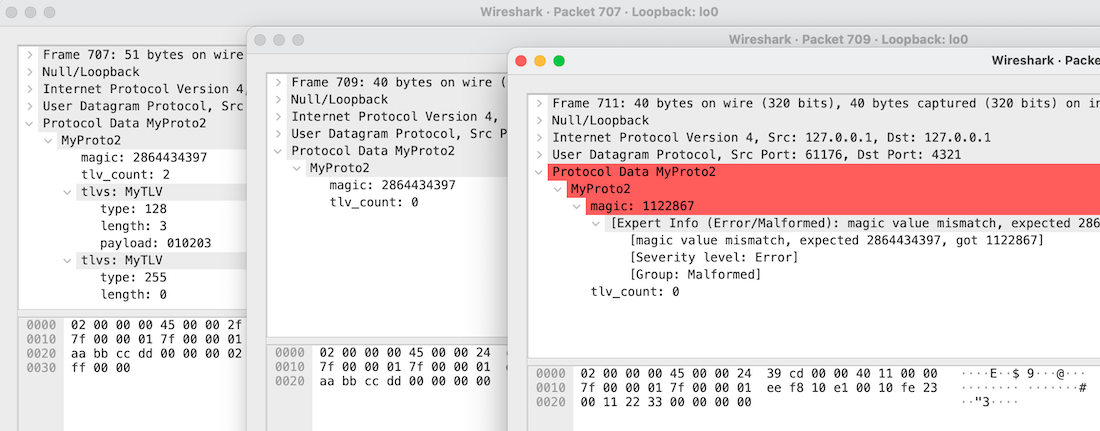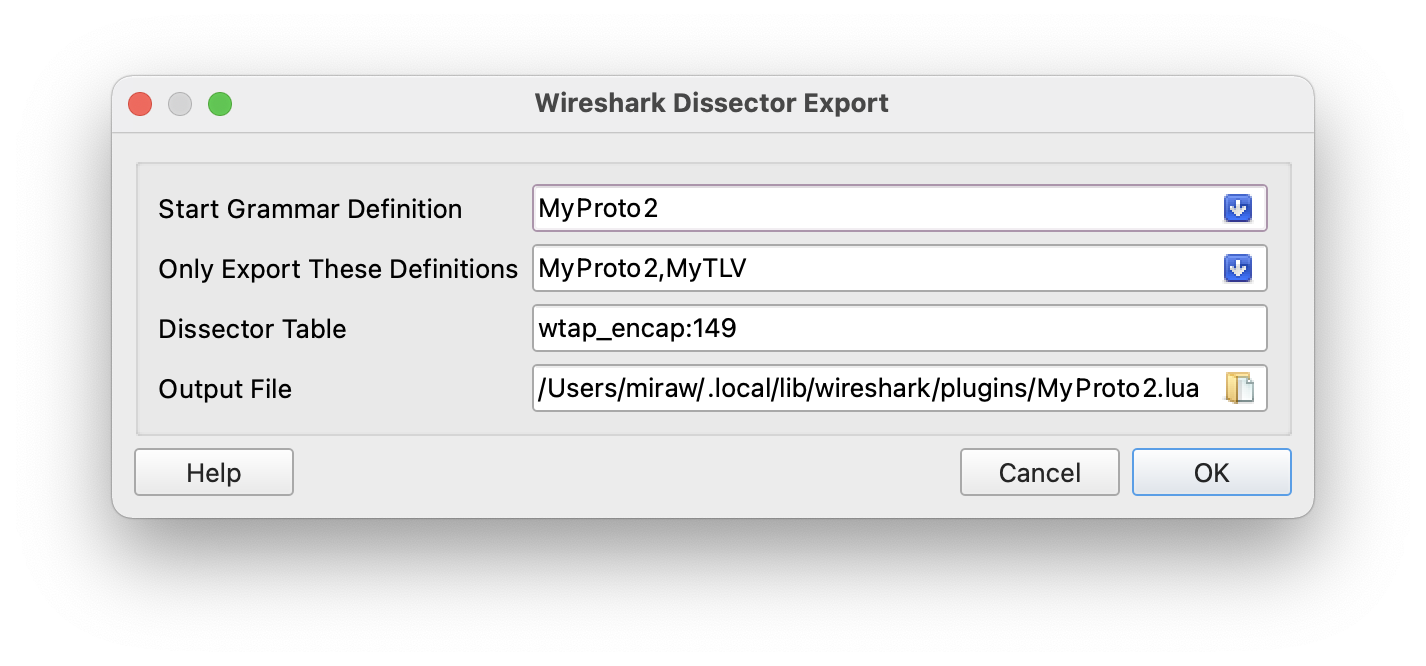Code Generator for Wireshark Dissectors
PRE Workbench provides a proof-of-concept code generator for Wireshark Lua dissectors, which supports a subset of the protocol grammar language.
Supported Features
Types:
- struct
- repeat
- INT / UINT, STRING, BYTES
- named reference to other types defined in the same file
Parameters:
- INT, UINT: endianness
- INT, UINT: magic
- BYTES, INT, UINT: show="hex"
- repeat: times
- STRING, BYTES: size
Expressions:
- references to INT / UINT fields in the same structure or a parent structure
- basic maths
Example
Store your protocol grammar either in a project or in a text file my_proto.txt:
MyProto struct(endianness=">") {
magic UINT32(magic=2864434397, show="hex", color="#aa0000")
tlv_count UINT32
tlvs repeat(times=(tlv_count)) MyTLV
}
MyTLV struct(endianness=">") {
type UINT16(color="#aaaa00")
length UINT16(color="#00aa00")
payload BYTES[length](color="#0000aa")
}
Call the code generator as follows:
prewb_codegen -P path/to/project -o ~/.local/lib/wireshark/plugins/my_proto.lua --dissector-table udp.port:4321
# or
prewb_codegen -F my_proto.txt -o ~/.local/lib/wireshark/plugins/my_proto.lua --dissector-table udp.port:4321
Run Wireshark and load a PCAP file containing protocol samples in a UDP file on port 4321. Alternatively, start a capture on
the loopback device, enter filter udp.port==4321 and send some samples using netcat:
# example with 2 TLVs, one without payload
printf '\xAA\xBB\xCC\xDD\x00\x00\x00\x02\x00\x80\x00\x03\x01\x02\x03\x00\xFF\x00\x00' | nc -u localhost 4321
# example with 0 TLVs
printf '\xAA\xBB\xCC\xDD\x00\x00\x00\x00' | nc -u localhost 4321
# example with wrong magic number
printf '\x00\x11\x22\x33\x00\x00\x00\x00' | nc -u localhost 4321

Usage
If you installed PRE Workbench as a Python module, you can run the code generator from the command line, using the command prewb_codegen.
usage: prewb_codegen [-h] [-P DIR] [-F FILENAME] [-e GRAMMAR] [-t TYPENAMES] [-d NAME] [-l LANG] [--dissector-table NAME:KEY] [-o FILENAME]
PRE Workbench - Wireshark Dissector Generator
optional arguments:
-h, --help show this help message and exit
-P DIR, --project DIR
Grammar definitions from project directory
-F FILENAME, --grammar-file FILENAME
Grammar definitions from text file
-e GRAMMAR, --grammar-string GRAMMAR
Grammar definitions from command line argument
-t TYPENAMES, --only-types TYPENAMES
Generate code only for specified types (comma-separated list)
-d NAME, --definition NAME
Name of start grammar definition. Uses first if unspecified
-l LANG, --language LANG
Programming language to generate (supported: lua)
--dissector-table NAME:KEY
Register the protocol in the given dissector table, under the given key
-o FILENAME, --output-file FILENAME
Output filename for generated code (default: "-" for stdout)
In any case, you can run it from the GUI from the Parser menu. The available features are similar in both usage modes.
The GUI feature always uses the current project as source for the grammar definitions,
as if --project on the CLI.
With the "Only Export These Definitions" option, you can limit which definitions are exported. Either specify a comma-separated list or use the blue select button.
The "Dissector Table" option accepts a comma-separated list of dissector table name and pattern,
under which the dissector will register itself. Example: "wtap_encap:149,udp.port:7890" registers
as a raw DLT_USER protocol (DLT: 149) as well as a udp-based protocol (port: 7890).

Limitations
Our current code generator implementation is limited to a subset of possible PRE Workbench protocol grammars. Only structures, repetitions, named references to other types and a subset of the built-in types are supported, other types like variant, union and switch could not be implemented yet due to time constraints. In the expression syntax, only simple expressions consisting of references to fields in the same structure, as well as basic maths, are supported.